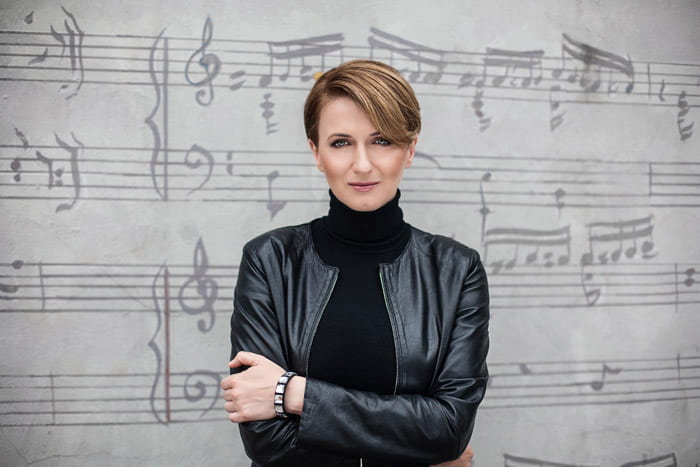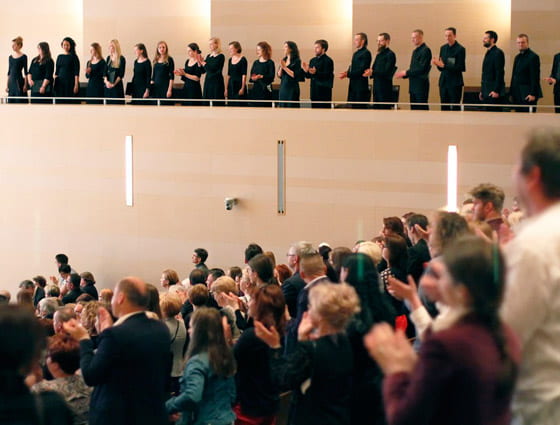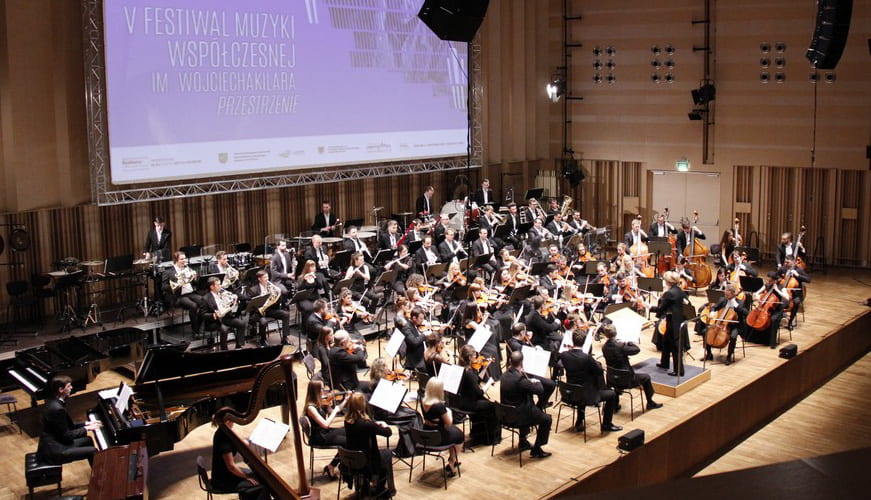by Marek Zebrowski
In many ways the Gorzów Philharmonic is unique among the music institutions in Poland. Established in 2011, it is a very young orchestra and—in spite of its babyish age—already a very accomplished and artistically important ensemble. Located in a regional center of Gorzów Wielkopolski—a city of 125,000 inhabitants located in northwestern Poland—this orchestra does not serve an established base of concertgoers, like the well-known orchestras in Warsaw, Katowice, or other major Polish cities. Instead, Gorzów Philharmonic seems to attract audiences from the entire region that encompasses such cities in western Poland as Zielona Góra, Poznań and Szczecin as well as the city of Frankfurt am Oder and other, smaller communities on both sides of the Odra River that has served as Poland’s international boundary since the end of World War II.
Gorzów Philharmonic’s other great asset is its brand new and acoustically perfect concert hall that would be a dream of any mid- or large-sized town anywhere on the planet. With a carefully-planned infrastructure that includes the main concert hall, chamber concert auditorium, rehearsal areas and extensive wing housing office space and conference rooms, the entire Philharmonic complex with its underground parking is an attractive seat for events of all kinds, from classical repertoire of symphonic music to ballet, children concerts, pops and jazz shows, community events, and more. Since its opening season, this very attractive venue had already hosted a number of great guest conductors, including Krzesimir Dębski, Kazimierz Kord, Jerzy Maksymiuk, Krzysztof Penderecki, Wojciech Rajski, Tadeusz Strugała, Maxim Vengerov, Antoni Wit and such world-famous soloists as Thomas Hampson, Krzysztof Jakowicz, Ivan Monighetti, Adam Makowicz, Leszek Możdżer, Piotr Paleczny, Włodek Pawlik, and others.
In spite of its very young age, the Gorzów Philharmonic is already a very cohesive ensemble displaying admirable energy, enthusiasm and accomplished musicianship. The orchestra already produced two highly acclaimed albums, including the 2012 recording of violin concertos by Sibelius and Tchaikovsky with Soyoung Moon, a winner of the Wieniawski International Violin Competition, and the 2015 CD “Spotkanie” [Encounter], featuring film music by Bronisław Kaper and Jan A.P. Kaczmarek.
 In many ways, the spectacular career of the Gorzów Philharmonic is the handiwork of Monika Wolińska, a gifted and dedicated conductor who assumed the reins of the Gorzów Philharmonic in April of 2013. This excellent and highly motivated maestra has been featured in concerts across the world and received an award from Poland’s Ministry of Culture and National Heritage in 2011 for her services to Polish culture. Monika Wolińska is also the recipient of 2013 Beautiful Poland Award and the 2016 Gorzów Rotary Club Award for promoting the city of Gorzów around the world. Monika Wolińska began to study music at the age of six, concentrating on mastering the violin, vocal and instrumental conducting as well as orchestral conducting. She is currently a professor at the Warsaw’s Chopin University and recorded such rarely-presented repertoire as symphonic poems of Eugeniusz Morawski with Sinfonia Varsovia. Maestra Wolińska also held the reins of Sinfonia Iuventus during the concert season 2007-2008, performed at the Four Cultures Festival in Łódź on numerous occasions, and worked with the Warsaw Music Academy Symphony Orchestra during the years 2003-2009. She has also participated in a number of master classes led by such conducting legends as Pierre Boulez, Kurt Masur, and Antoni Wit.
In many ways, the spectacular career of the Gorzów Philharmonic is the handiwork of Monika Wolińska, a gifted and dedicated conductor who assumed the reins of the Gorzów Philharmonic in April of 2013. This excellent and highly motivated maestra has been featured in concerts across the world and received an award from Poland’s Ministry of Culture and National Heritage in 2011 for her services to Polish culture. Monika Wolińska is also the recipient of 2013 Beautiful Poland Award and the 2016 Gorzów Rotary Club Award for promoting the city of Gorzów around the world. Monika Wolińska began to study music at the age of six, concentrating on mastering the violin, vocal and instrumental conducting as well as orchestral conducting. She is currently a professor at the Warsaw’s Chopin University and recorded such rarely-presented repertoire as symphonic poems of Eugeniusz Morawski with Sinfonia Varsovia. Maestra Wolińska also held the reins of Sinfonia Iuventus during the concert season 2007-2008, performed at the Four Cultures Festival in Łódź on numerous occasions, and worked with the Warsaw Music Academy Symphony Orchestra during the years 2003-2009. She has also participated in a number of master classes led by such conducting legends as Pierre Boulez, Kurt Masur, and Antoni Wit.
A great champion of contemporary music, Monika Wolińska has broadened the horizons of the Gorzów Philharmonic by programming a wide variety of repertoire, from classical staples to film and contemporary music. Since 2013 she has been the Artistic Director of the Wojciech Kilar Contemporary Music Festival. The latest—and fifth edition—of this Festival was inaugurated with a monumental concert at the Gorzów Philharmonic concert hall on May 12. The program began with John Corigliano’s Promenade Overture. Commissioned by the Boston Symphony Orchestra for its centenary season, this work was premiered in 1981 under the baton of John Williams. A virtuoso and highly effective work for a large orchestra, the Overture begins with the conductor presiding over a gradual entry onto the stage—section by section—of the entire orchestra that keeps building into a large and highly satisfying climax of this clever and well-constructed piece.
Having assembled her group on stage, Maestra Wolińska proceeded to lead Gorzów Philharmonic in a passionate rendition of Maciej Małecki’s Walc koncertowy na orkiestrę [Concert Waltz for Orchestra]. Written in 2007, this massive 20-minute work is a challenge to all sections of the orchestra, from winds and percussion to strings. A cross between Ravel’s Bolero and La Valse and Strauss’s Rosenkavalier, this demanding work had shown both the conductor and the ensemble more than equal to the task, and the audience was swept away by the grandiose and ultra-romantic language of this contemporary epic.
Next came the Concerto for Piano and Orchestra by Henryk Wars. Known for countless hit songs from the 1930s films in Poland, Wars (who adopted American spelling of his name, “Vars,” after settling in the U.S. in 1947) devoted a few early years of his American exile to writing symphonic music, a fact largely unknown until his scores were rediscovered in the 1990s and later donated to the USC Polish Music Center in Los Angeles. Besides his Piano Concerto, Wars left a four-movement Symphony, an orchestral suite, City Sketches, overtures and other incidental music that only recently has returned to the concert stage. Wars’s Piano Concerto is a one-movement work that successfully blends virtuosity with sweeping melodies of his hit tunes and successfully employs the Hollywood film music idiom that the composer employed to great advantage in music composed for his soundtracks to John Wayne’s Westerns and such popular favorites as the film Flipper or the Daktari TV series.

Keeping with the exciting programming selections, Monika Wolińska then paired Henryk Mikołaj Górecki’s Dwa postludia tristanowskie i chorał [Two Tristan Postludes and Chorale] Op. 82 and Mikołaj Górecki’s Nokturn na orkiestrę [Nocturne for Orchestra] as a musical tribute to this rather unique father and son relationship. Sketches for the Tristan Postludes were orchestrated after Górecki’s death by his son, Mikołaj, and his Nocturne is a touching tribute to Górecki senior by his son, a gifted composer in his own right. After the fireworks of the first half of the program provided by Corigliano, Małecki and Wars, this half-hour section of the concert after the intermission, provided a contemplative, quiet repose for the audience assembled at the Gorzów Philharmonic concert hall for the evening.

The rousing finale of the concert came with Wojciech Kilar’s Exodus for mixed choir and orchestra. Clearly modeled on Ravel’s Bolero and Orff’s Carmina Burana, Kilar’s epic work provided a stunning and highly successful conclusion to the concert. Prepared by Bartosz Michałowski, the Poznań Chamber Choir sang from the balconies on the upper right and left of the hall. The huge orchestral ensemble—with two harps that gently began the narration of the Exodus with its story of deliverance from Egypt—rose into a climactic crescendo with brass and choir singing about the memorable crossing of the Red Sea. This exalted and triumphant music catapulted the audience from their seats as soon as the last and frenzied chords and shouts of the choristers closed Kilar’s piece. A ten-minute standing ovation ensued with the audience deeply moved by the experience of this marathon, three-hour concert. The music rose to the sublime heights of passion under the baton of Monika Wolińska. The choir delivered with gusto the message of the Book of Exodus. The orchestra sounded like one of the best ensembles in the world—clearly a match for any American ensemble, from Boston and Cleveland, to Philadelphia and New York. The young musicians—and the average age of the players must be well under thirty—beamed with pleasure. Many in the audience shed a tear or two in tribute to great music and great interpretation. It was an evening to remember and cherish, especially since this is Monika Wolińska’s last season with the Gorzów Philharmonic. She built the orchestra up to a world standard and now she’s poised to move on to larger assignments. The orchestra that attained great excellence in the shortest of time—five seasons—is now poised to grow and continue, making great music not only for the provincial city of Gorzów Wielkopolski, but for the entire region of western Poland, eastern Germany, and beyond—as more concerts and recordings by this exceptional ensemble should follow.
Read another review of the concert at gorzow.wyborcza.pl.
[Note: all photos above are property of the Gorzów Philharmonic, with the exception of the solo photo of Monika Wolińska, which was taken by Barbara Piotrowska]
